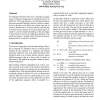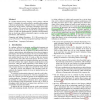443 search results - page 7 / 89 » The economics of garbage collection |
112
click to vote
IWMM
1992
Springer
15 years 4 months ago
1992
Springer
Abstract. We present a garbage collection algorithm that extends generational scavenging to collect large older generations (mature objects) non-disruptively. The algorithm's ...
117
click to vote
IWMM
1998
Springer
15 years 4 months ago
1998
Springer
For Garbage Collection (GC) to be a generally accepted means of memory management it is required to prove its efficiency. This paper presents a scheme that guarantees that an incr...
88
Voted
LFP
1994
15 years 2 months ago
1994
We present a method, adapted to polymorphically typed functional languages, to detect and collect more garbage than existing GCs. It can be applied to strict or lazy higher order ...
127
click to vote
ICDCS
2005
IEEE
15 years 6 months ago
2005
IEEE
Communication-induced checkpointing protocols that ensure rollback-dependency trackability (RDT) guarantee important properties to the recovery system without explicit coordinatio...
118
click to vote
IWMM
2011
Springer
14 years 3 months ago
2011
Springer
In a parallel, shared-memory, language with a garbage collected heap, it is desirable for each processor to perform minor garbage collections independently. Although obvious, it i...


